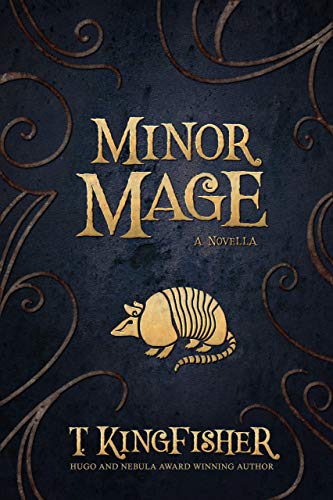Kelson Reads a publié une critique de Minor Mage par T. Kingfisher
By turns melancholy and creepy, with a dash of sarcastic armadillo
Minor Mage is firmly in the "kid goes on scary quest and comes back stronger" genre. The 12-year-old protagonist is cast out to complete a nigh-impossible quest alone (aside from his armadillo familiar), facing ghouls and starvation and bandits and ghosts and murderers. He's a wizard, yes, but he's barely half-trained and only knows a handful of spells (though his herbal lore is pretty strong). Like the young heroes of A Wizard's Guide to Defensive Baking and Illuminations, he has to learn how to make the most of his limited abilities in order to survive -- only this story takes place not in a city but mostly in wilderness an abandoned farmlands.
From an adult perspective, Oliver's constant lamenting that he's "only a minor mage" starts to grate after a while. But that's not the perspective it's written for: it's a kids' book, and operates on kids' fantasy …
Minor Mage is firmly in the "kid goes on scary quest and comes back stronger" genre. The 12-year-old protagonist is cast out to complete a nigh-impossible quest alone (aside from his armadillo familiar), facing ghouls and starvation and bandits and ghosts and murderers. He's a wizard, yes, but he's barely half-trained and only knows a handful of spells (though his herbal lore is pretty strong). Like the young heroes of A Wizard's Guide to Defensive Baking and Illuminations, he has to learn how to make the most of his limited abilities in order to survive -- only this story takes place not in a city but mostly in wilderness an abandoned farmlands.
From an adult perspective, Oliver's constant lamenting that he's "only a minor mage" starts to grate after a while. But that's not the perspective it's written for: it's a kids' book, and operates on kids' fantasy logic.
Speaking of the target audience: In the afterward, Kingfisher/Vernon talks about trying to convince editors that yes, this is a children's book, and getting constant pushback that it's "too scary." (This is how she ended up publishing it as Kingfisher rather than Vernon) It reminded me of similar comments Neil Gaiman wrote about Coraline, remarking that it was too scary for adults but not too scary for children.
Sometimes I wonder: Do these editors remember being 12?

